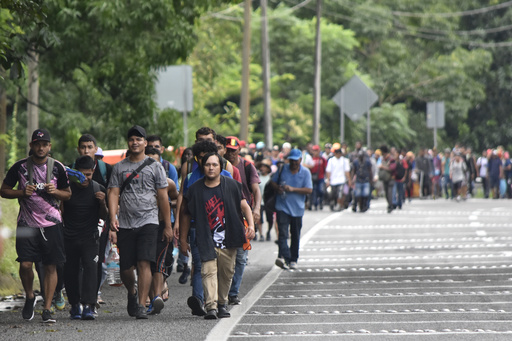
TAPACHULA, Mexico — On Wednesday, a group of approximately 1,500 migrants initiated a new caravan in southern Mexico, with aspirations of reaching the United States border. The individuals in this caravan primarily hail from Central and South America. Many of them are motivated by a desire to arrive in the U.S. before Donald Trump’s inauguration in January, expressing concerns that their chances might diminish afterward. They commenced their journey from Tapachula, a city adjacent to the Guatemalan border, where countless migrants remain stuck due to a lack of permits to proceed further into Mexico.
Migrant caravans have been a notable phenomenon since their inception in 2018, often representing a final attempt for less affluent migrants who cannot afford to engage the services of smugglers. When they attempt to traverse Mexico alone or in smaller groups, they risk being detained by authorities and sent back to southern Mexico or even deported to their home countries. Consequently, traveling in larger groups provides a semblance of safety, as immigration agents find it challenging, if not impossible, to manage hundreds of migrants at once. Typically, these caravans disband or halt their progress within a distance of approximately 150 miles (250 kilometers).
However, safety in numbers does little to protect against threats posed by drug cartels in Mexico, who have become deeply entrenched in human trafficking. These cartels impose fees on migrants or their smugglers to permit passage through their territories near the border. Additionally, they often resort to kidnapping, subjecting migrants to dire conditions, and even torture until relatives can be contacted for ransom. The most daunting challenges, though, include extreme heat, dehydration, and the sheer distance: the journey from Tapachula to the nearest border point at Matamoros, which lies opposite Brownsville, Texas, spans over 1,100 miles (1,780 kilometers). This route, the shortest available, is also notorious for its dangers and would necessitate around 16 consecutive days of walking for an adult without any breaks, complicating matters for migrants traveling with children.
For many migrants, the lack of employment opportunities in Tapachula creates an urgent desire to move on. A considerable number feel a pressing need to reach the border before Trump’s inauguration on January 20. “It is going to be more difficult; that’s why we are going in hopes of getting an appointment quicker so we are able to cross before he (Trump) takes office,” expressed Yotzeli Peña, a 23-year-old migrant from Venezuela. “That would be easier.”
This year, the U.S. government implemented measures aimed at curbing the formation of migrant caravans by expanding the areas where individuals can apply online for appointments to enter the United States. The CBP One mobile application was introduced to create a more organized process for asylum claims, offering around 1,450 appointments daily. However, this application was limited to northern and central Mexico initially. By extending the app’s availability to Tapachula, officials hoped to mitigate the inflow toward the north. Nonetheless, many migrants prefer to remain near the border to ensure quick access to appointments should they be fortunate enough to secure one. Trump has previously pledged to abolish the app, reduce legal entry routes to the U.S., and facilitate mass deportations.
Historically, meaningful progress has been made in 2018 and 2019 when some of the largest caravans were formed, and during that time, Mexican officials took steps to assist some migrants, organizing bus transportation to border cities. This practice, however, drew criticism from local communities. While some individuals from those earlier caravans ultimately reached the border, subsequent groups have adopted a strategy of seeking out rides, often hitching onto empty trucks. Unfortunately, this has become increasingly difficult as Mexican authorities have discouraged public transport from picking up migrants. In recent years, authorities have occasionally offered temporary transit permits in an attempt to dissolve the caravans.
